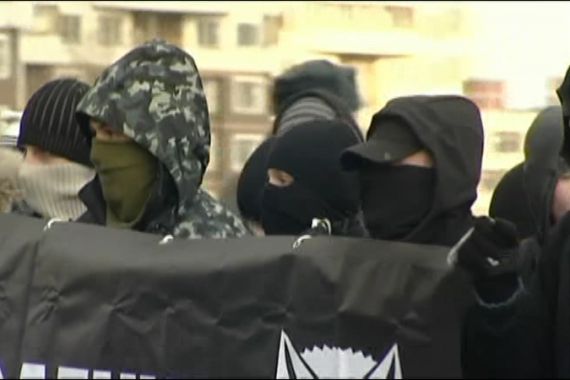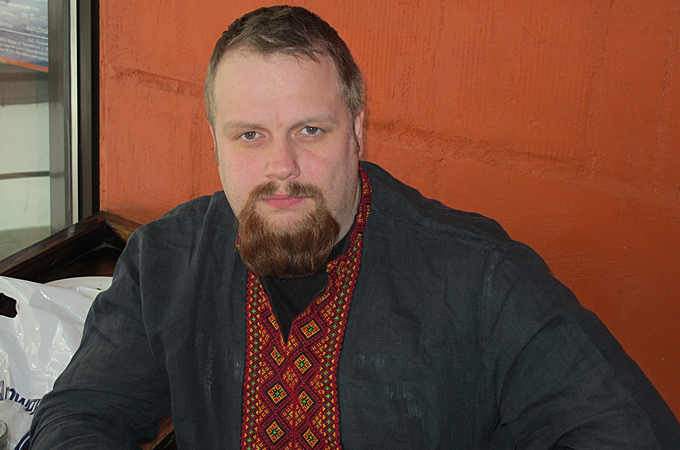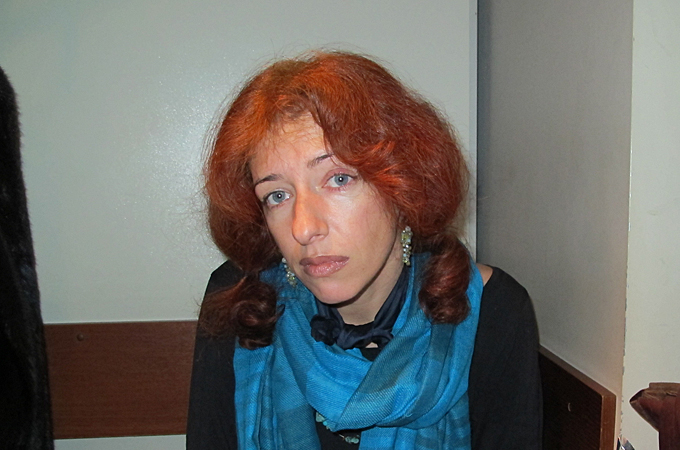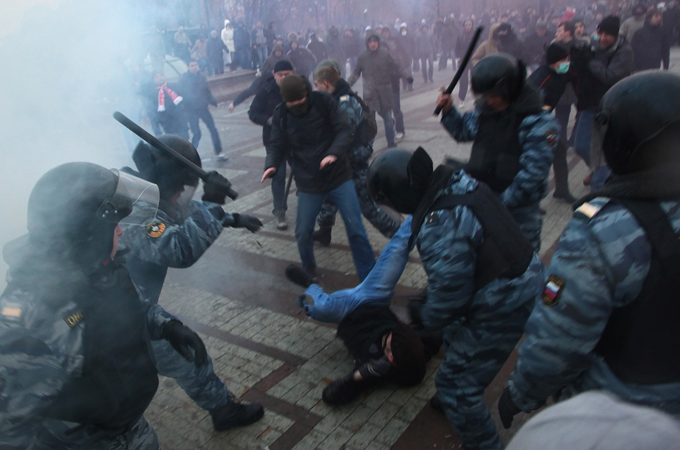Candidates exploit nationalism in Russia poll
Several candidates running for Russia’s presidential election are seeking to exploit growing nationalistic sentiments.

 |
| Dyomushkin’s Slavic Union was banned by the Moscow City court in April last year [Christopher True/Al Jazeera] |
MOSCOW: Dmitry Dyomushkin held forth on his ultra-nationalist views, sitting in a cafe in Merino, a rundown suburb in the south of Moscow.
He had founded the Slavic Union, called the Slavyansky Soyuz, or “SS”, in 1999.
The organisation was banned by the Moscow City court in April last year, saying it promoted a nationalistic supremacy similar to the ideology of Nazi Germany.
Asked if he supported the views of Adolf Hitler, he side-steps a direct answer. But he does say he believes that former Soviet republics with majority Muslim populations, such as Chechnya and Ingushetia, should be thrown out of the Russian Federation.
Scores of his supporters have been arrested for hate crimes and several are serving life sentences for murder.
Dyomushkin says his organisation is mainly concerned with the rights of Russians in Russia and tackling growing immigration, particularly from the Caucasus.
More than a million migrant workers come to Russia each year, mainly from Uzbekistan, Tajikistan and the Caucasus seeking a better life and work conditions.
Many of them stay in the country illegally, sending much of their wages back to their homelands.
While Dyomushkin represents the unpalatable side of nationalism in Russia, many of his sentiments are widely shared among Russians.
Several polls show about 60 per cent of the country’s people agree with the sentiment “Russia for the Russians”.
Some flats in Moscow have signs reading: “I only rent to Russians.”
Many Muscovites complain of people from Azerbaijan holding a monopoly on the capital’s street markets and people from Armenia taking all of the construction jobs.
Several of the candidates running in Russia’s March 4 presidential election have looked to profit from this growing anger and subsequent support for the far right by hardening their views on immigration and adopting an increasingly nationalistic tone.
Ethnic affiliations
In January, Vladimir Putin, Russia ‘s prime minister who is running for a third term of president, suggested closing the door for up to 10 years to migrants who have repeatedly violated Russia’s migration laws.
 |
| Lokshina says Putin’s actions against far-right groups came too late [Christopher True/Al Jazeera] |
Russia has a visa-free agreement with most former Soviet republics and Putin said that he realised that many illegal migrants get extradited from Russia and then “go home at our expense and come back”.
Gennady Zyuganov, the Communist Party’s candidate, has called for a plan to reinstate ethnic affiliations in Russian passports.
During the Soviet Union this “nationality” category was used to facilitate discrimination against Chechens, ethnic Germans and Jews in Russia.
In a televised debate on Wednesday, Mikhail Prokhorov, the only independent candidate in the race, called for stricter border controls and visa regulation to prevent illegal immigration.
‘Stop feeding the Caucasus’
Many Russians have also become increasingly angry about the vast amounts of money the central government continues to spend in regions on the fringes of its territory.
Several billion dollars have been spent in the northern Caucasus alone, while Russians argue that funds are lacking for education and healthcare in their own country.
In September, far-right groups launched a campaign under the slogan “Stop feeding the Caucasus!” against what they said was the “excessive” financial support for the region.
The campaign, which saw rallies in several of Russia’s main cities, was organised by nationalist groups, the Russian Public Movement and the Russian Civil Union.
The slogan was in fact invented by Alex Navalny, the anti-corruption blogger seen by many as the informal leader of the protest movement that has flowered in the last few months in Russia.
Vladimir Zhirinovsky, the presidential candidate of the nationalist Liberal Democratic Party of Russia, is using the “Russia for Russians” slogan to find support for an end to the billions of dollars being sent to the Caucasus.
Zhirinovsky has also distributed 12 million copies of a brochure in which he says the government “takes money from the pocket of the working Ivan and gives it to the bandit Mohammed, who cuts Ivan up in pieces and buys himself a third Mercedes”.
The Liberal Democratic Party took 12.5 per cent of the vote in parliamentary elections in December.
Speaking to Al Jazeera, Tanya Lokshina, deputy director of Human Rights Watch’s Moscow office, said: “It is considered acceptable for public officials to make xenophobic statements, as long as they are not considered inflammatory, I mean they wouldn’t call for murder, and that in itself has quite an impact on the public at large.”
Soviet suppression
The recent historical roots of Russia’s increasing nationalism and anti-immigration views are easy to plot, as are the Kremlin’s previous attempts to gain advantage from them.
 |
| Riot police clashed with football fans during a protest in Moscow related to the death of Sviridov [EPA] |
During the days of the Soviet Union, nationalist views were suppressed – both the Russian feelings about the smaller republics and the aspirations of those republics themselves.
Following the collapse of Communism, many of these frustrations were set free and far-right groups began to gather supporters, exercising their new found freedoms.
Groups such as the Slavic Union complained that the Russian people, the “elder brother” nation during Soviet times, were increasingly being put at a disadvantage by their younger upstarts.
Under Putin’s second term as president, from 2004, the number of members of far-right groups increased significantly, as did their attacks on immigrants.
Worried about the Orange Revolution taking place in Ukraine, where a campaign of civil disobedience brought about a re-run of a widely discredited presidential vote, Putin turned a blind eye to such attacks.
Many attacks on immigrants, including murders, were not recorded as hate crimes and police were discouraged from following up cases.
Speaking to Al Jazeera, Vera Alperovich, a researcher at the Moscow-based Sova Centre, which conducts research and informational work on nationalism and racism, says the far-right groups began to see themselves as “untouchable”.
Unsurprisingly, the attacks increased until 2008 when the government saw the far-right groups as being more dangerous than any benefits they could bring to defending the state.
As a result, between 2009 and 2010, nearly all the main protagonists were arrested and the number of hate crimes dropped dramatically.
However, Lokshina says the action came too late and far-right groups had become a well organised and entrenched part of Russian society.
Dangerous game
In the last couple of years, Putin, who is widely expected to win Sunday’s vote, has again changed course, attempting to woo nationalist sentiments.
In December 2010, Putin laid flowers on the grave of a Spartak Moscow football fan, Yegor Sviridov, who was shot dead in a fight with migrants from the North Caucasus region earlier that month.
The incident had sparked race-hate riots and ethnic clashes across Russia, including a violence between more than 5,000 football supporters and police outside walls of the Kremlin.
Lokshina says Putin’s gesture was widely seen as being as supportive of Russian nationalist values over those of non-Russians.
Speaking in January, Putin said: “Russia is not going to close itself off from the outside world but we must by all means toughen our migration policy, including labor migration regulations.”
The prime minister has also annouced that from 2013, immigrants should be subject to immigration status examinations on Russian language, history, literature and civics.
Pandering to nationalistic instincts, it seems, is in vogue in the run up to the polls.